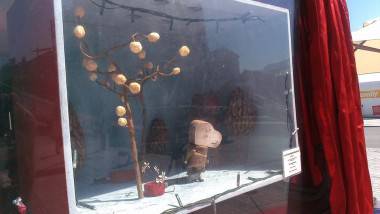Annecy 2014 – Short Film Highlights
In contemplation of a nude painting of himself in a now-archaic Simpsons episode, notorious corporate sociopath Mr. Burns paraphrases the famous line when he concedes “I may not know art, but I know what I hate…and I don’t hate this.”
Many is the time I hear that one echoing around my brain in a film festival situation, especially the ones which lean more toward the perceivably highbrow. There was a time when I didn’t know art but merely what I liked, until secondary school methodically beat art appreciation into me. Now that I know art and what I like, should I be troubled that the overlap of both dwindles as I get older? It just seems to me that the shortness of life in and of itself renders the impulse to tell the world “Hey, everyone, listen up: I’m a sophisticate. I’m cultured.” in lieu of doing things we actually enjoy a little…nearsighted?
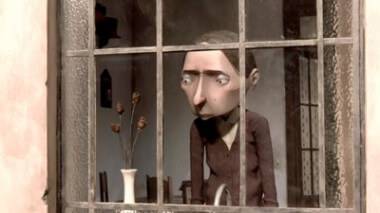
Padre (Dir. Santiago Bou Grasso)
When presented with its official selection, Annecy lives up to its reputation as being a ‘grown-up’ festival, enthusiastic to distance itself as much as possible from the cursed notion that animation is a children’s medium and, in the doing so, celebrate its artistic value. There’s certainly no doubt in my mind that such value is high and abundant, however the effect of a powerful short film is tamped down when amongst so many others striving for the same degree of artistic validation. Once you’ve seen the seventh film in a row drawn on scratchboard whose fundamental message is ‘genocide is bad’ or ‘depression is depressing’, the flavour tends to go pretty quickly (even a thematically grouped screening works best when, at the very least, there’s some visual variety).
In truth, when considering that the major draws and most-discussed events were from the Disney/Pixar/Dreamworks/Cartoon Network world of mainstream animation, perhaps by having the competition selection so skewed toward the introspective, the abstract, the sociopolitical, the (dare I say) avant-garde, is essential to provide balance to the festival as a whole? Personally I’m going to go on record and say that, as lovely as it can be when in the mood, sometimes I’d rather eat pizza than caviar, rather drink a Frappacino than a 25-year aged A’bunadh and rather watch a coyote fall off a cliff than a naked man smash a baby’s brains out because…I dunno, something about hippos?
So to that end, here are some of the films which stood out as firing on the most cylinders at once, in terms of technical execution (so many of the ‘artsy’ films would be immediately forgivable were they actually animated better), strength of story and consistency of overall quality. This only reflects my outlook – the Ben Mitchell Annecy Mixtape, if you will – so I’m keen to hear and discuss what others who were there have to say.
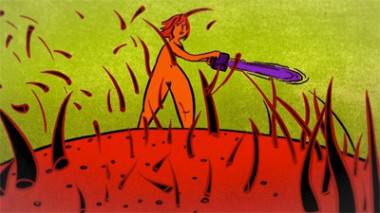
Hair (Dir. Delphine Hermans)
In terms of outright entertainment, one of the biggest crowdpleasers across the board was the Brothers McLeod‘s ambitious 365, for which one second of disconnected, oftentimes surreal animation was created per day over the course of a year; While no underlying narrative or throughline presents itself, the unabashed goofiness of it won over the audience instantly, and being limited to 365 seconds kept it from outstaying its welcome. The charming 2D short Timber by Nils Hedinger, wherein a refugee assortment of anthropomorphised logs and branches take shelter from the cold together only to turn on one another for firewood, was another standout, witty and thoughtful in equal measure. Appealing to my own personal sensibilities and fondness for an aesthetic evocative of 90s illustration, Delphine Herman’s ribald Hair is rich with bawdy joie de vivre and strong, fluid animation matched with excellent timing. Similarly, the UK stop-motion out-of-competition entry Sandy from Joseph Mann brilliantly manages to take the main visual concept – a somewhat confused (or perhaps not) child crafting an idealised sand companion for himself on a beach while the adults around him engage in heavy petting – and render it not only charming but surprisingly innocuous.
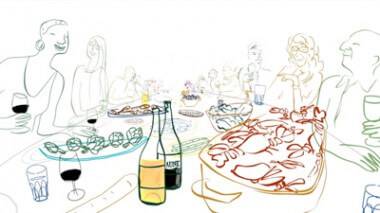
Impromptu (Dir. Bruce Alcock)
The NFB were well-represented with a strong showcase demonstrating the studio’s receptiveness to a wide range of genres and methods, with legendary Estonian duo Priit and Olga Pärn’s typically unforgiving Pilots on the Way Home a chasm apart from the light fare of Torill Kove‘s pathos-infused childhood remembrance Me & My Moulton and TALI’s Bus Story, a warmhearted (though thankfully not at all saccharine) story of an earnest bus driver finding her feet. Particularly engaging was Nicola Lemay and Janice Nadeau‘s first outing as a directorial duo No Fish Where To Go, an adaptation of a brutally honest children’s story by Marie-Francine Hébert about the injustices of persecution which perfectly maintans the distinct style of Nadeau’s original book illustrations. While not in competition, the charm of Bruce Alcock‘s Impromptu shines through its minimal visuals – though created as a stereoscopic film, the depth and thought of the effective line-work carries across even when viewed in 2D.
The one piece of mixed-media loveliness which lined up most with my fondness for the bizarre and humorously unsettling was Time, Becky Sloan and Joe Pelling‘s follow up to the Wonder Showzen-esque viral smash Don’t Hug Me, I’m Scared featuring the same cast of not-Muppets singing ludicrous contemplations of the nature of time. Though the live-action outweighs the animation, the brilliant moments of increasingly grim humour give it a pass.
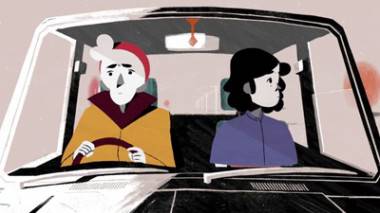
Phantom Limb (Dir. Alex Grigg)
Similarly satisfying my love for the weird, Calvin Antoine Bladin‘s La Chair de ma Chère is a minimal, Lynch-meets-Minecraft tale which seemingly trades story for atmosphere, then trades back again for a well-executed final scene. While not everything is clear at first viewing, as with most strong shorts it calls you back for a second look. As does Alex Grigg‘s captivating Phantom Limb, a short which debuted as part of the Late Night Work Club‘s first anthology film Ghost Stories and which, through expertly-realised design and story, more than stands up as a film in its own right.
While I earlier made a passing reference to Piotr Dumala’s Hipopotamy (though divisive it was not nearly as shock-value dependent as other festivalgoers maintained; Its main offence was its dependence on repetition), I have to say that it has stuck in my head in terms of the animation itself. The – possibly rotoscoped – attention to detail when considering the anatomical construction, weight and body movement is rendered to a degree of sophistication rarely seen in this era of short film. Several other shorts were notable for their technical execution above all else, such as the gorgeous puppetry of El Empleo director Santiago Bou Grasso‘s Padre and Pickman’s Model by Pablo Ángeles, as well as the moments of inspired design work in Ivana Šebestová‘s Snow.
Other selected shorts which stood out as exceptional have already crossed our line of sight, such as Mikey Please’s Marilyn Myller, a standout from last year rendered in his well-known style of stop-motion foam animation. In many respects the film’s wry and very much on-point dig at the “Emperor’s New Clothes” syndrome modern art suffers from seemed especially apt given its Official Selection companions. Invocation by Robert Morgan also made a welcome appearance along with Nicolas Brault‘s Foreign Bodies and, a little further down the abstract end of the spectrum, Theodore Ushev’s 3rd Page From the Sun, originally an art installation piece, was translated effectively as a standalone short film.
As borderline-impossible as it is to determine a personal favourite, the one film which keeps popping into my head since seeing it is Éric Montchaud‘s adaptation of Anatole’s Little Saucepan. Beautifully constructed, the story of a young boy burdened with carrying a saucepan wherever he goes, to the point at which he feels compelled to retreat from society altogether, shone out and deservedly picked up the Audience Award as a consequence. While other films laboriously and disingenuously crowbarred in attempts to emotionally ‘hook’ the audience, through the simple and authentic realisation of the script married with perfectly lo-fi stop-motion, Saucepan managed to achieve a great deal more with less effort than easily half of the films it was screened amongst.
If you were able to attend this year’s festival and catch the screenings, let us know which films you thought stood out amongst the selection by getting in touch at ben@skwigly.co.uk


